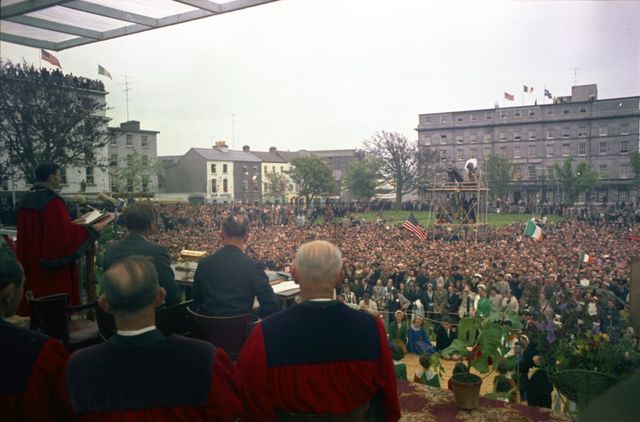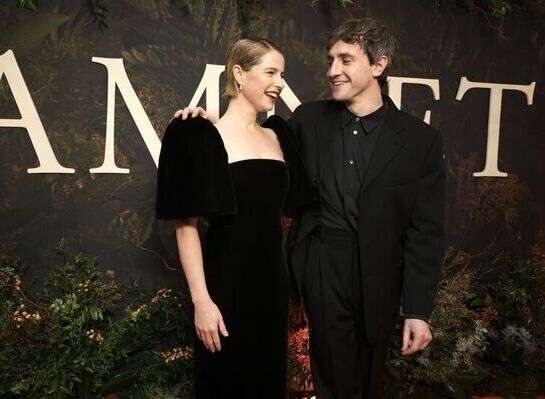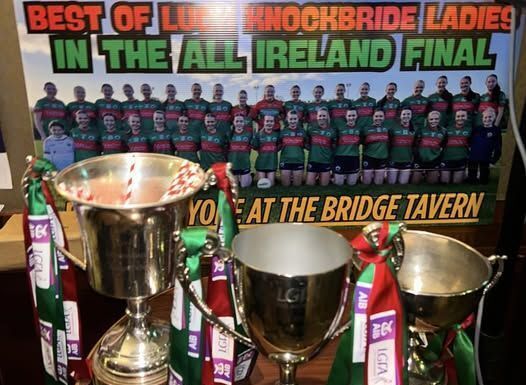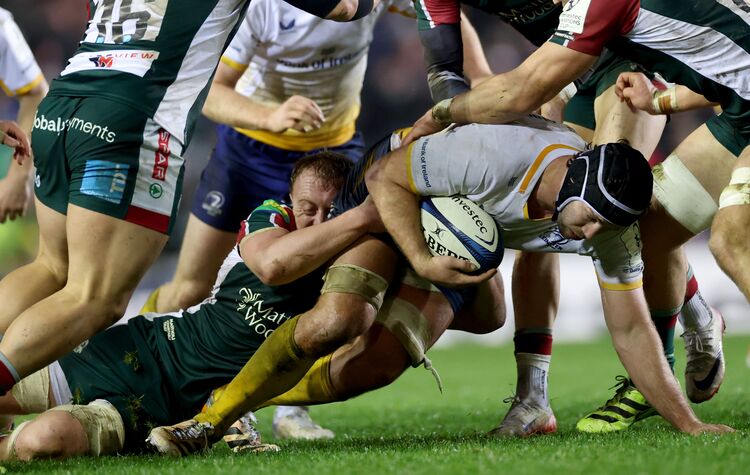After a three day visit to Ireland at the end of June 1963, President John F. Kennedy bid farewell to the people and the land of his ancestors.
“You send us home covered with gifts, which we can barely carry, but most of all you send us home with the warmest memories of you and of your country. So I must say, though other days may not be so bright as we look toward the future; that the brightest days will continue to be those in which we visited you here in Ireland.”
Throughout his visit, the youthful president was greeted by wildly cheering crowds, young and old, all showing their love for an admired world leader they considered one of their own. Friend and Presidential Assistant Dave Powers, told the president prior to his visit that it might be construed as a pleasure trip to Ireland, with Kennedy quickly responding, “That’s exactly what I want.”
Irish president Eamon de Valera greeted Kennedy upon his arrival in Dublin on June 26.
“We are proud of you, Mr. President. We admire you for the leadership you have given,” he said on the tarmac. “We trust that under God’s inspiration and with his help, you will be able to accomplish the aims which you have in mind, the aims of all who love mankind.”
Years later, Powers recalled the welcome Kennedy received that day in Dublin.
“It was such a wonderful, wonderful greeting and I can remember the shops, everywhere you looked, you saw the American flag and the Irish flag cross like this and a smiling picture of President Kennedy,” he said.
Powers traced Kennedy’s lineage back to a member of the royal Brian Boru family named Cinneide. When informed that the name roughly translated as “helmet head,” Kennedy responded dryly, “Let’s keep that quiet.” Independently, Kennedy discovered that some in his bloodline were forced to leave Ireland in the 17th century.
Irish politician Brian Lenihan, then a junior minister, recalled meeting Kennedy in the receiving line at the airport.
“My first impact was of a man of extraordinary personality; the minute he shook hands with you, you knew you were in the presence of somebody who meant something,” Lenihan recalled. “He had it, to use a phrase.”
At the time of his visit Kennedy was just 46 years old. He was a second generation Irish American, the first Catholic elected President of the United States and the first in the office to visit the Emerald Isle. Close confidant and speechwriter, Ted Sorensen recalled that Kennedy’s trip to Ireland was “one of the most moving experiences of his life.”
JFK.jpg
President Kennedy listening to a speech in Eyre Square
In Galway, Kennedy addressed a large and enthusiastic crowd, more than a few who were his relatives, delivering a very personal and heartfelt speech in his famous Boston-Irish accent.
“If the day was clear enough and if you went down to the bay and you looked west and your sight was good enough, you would see Boston, Massachusetts,” he said, flashing his famous smile; the audience roared back their approval.
Without missing a beat Kennedy continued “And if you did, you’d see down working on the docks there some Dougherty’s, and Flaherty’s and Ryan's and cousins of yours who have gone to Boston and made good.”
The president asked for a show of hands of those who had a relative in America “who’d you admit to. I don’t know what it is about you that causes me to think that nearly everybody in Boston comes from Galway. They’re not shy about it at all.”
Kennedy acknowledged the strong ties that exist between the United States and Ireland.
“It is strange that so many years could pass and so many generations pass and still some of us who came on this trip could come home to Ireland and feel ourselves at home and not feel ourselves in a strange country, but feel ourselves among neighbors, even though we’re separated by generations, by time and by thousands of miles,” he said.
Kennedy urged the audience to visit the United States.
“If you ever come to America, come to Washington; tell them if they wonder who you are at the gate, that you come from Galway. The words ‘Cead Mile Failte,’ will be out when you do, which means in Gaelic 100,000 welcomes,” Kennedy concluded.
The stop in Ireland was one leg of a European journey that also brought him to England, the Vatican in Italy and finally to Germany. It was there he delivered his memorable ‘Ich bin ein Berliner’ speech to a million people in the then divided and walled city of Berlin.
The European trip gave the president some reprieve from troubles at home; a burgeoning civil rights movement across an impatient South always on the brink of violence; a wrenching battle with the titans of the steel industry in a price hike dispute that he later won, and most importantly, eight months earlier he averted a nuclear war with Russia over missiles they were installing in Cuba just ninety miles from the shores of the United States.
In a speech before the combined houses of the Irish Parliament, the first Dail session televised throughout the country, Kennedy said that if better political and economic conditions had existed in 1860s Ireland “My great grandfather might never have left New Ross and I might, if fortunate, be sitting down there with you.” In a twist, he added smiling, “Of course, if your own President had never left Brooklyn [where he was born] he might be standing up here instead of me.”
Kennedy continued, acknowledging that both countries deeply cherish freedom.
“And so it is that our two nations, divided by distance, have been united by history. No people ever believed more deeply in the cause of Irish freedom than the people of the United States. And no country contributed more to building my own than your sons and daughters. They came to our shores in a mixture of hope and agony, and I would not underrate the difficulties of their course once they arrived in the United States. They left behind hearts, fields and a nation yearning to be free. It is no wonder that [native writer] James Joyce described the Atlantic as a bowel of bitter tears and an earlier poet wrote, ‘They are going, going, going and we cannot bid them stay.”
Kennedy said Ireland has much to offer the world.
“It is a free country and that is why any American feels at home,” he said. “My friends, Ireland’s hour has come. You have something to give to the world and that is a future of peace and freedom.”
At the time of Kennedy’s visit, the stifling depression of 1950s Ireland, marked by high unemployment and emigration, was losing its grip on the country; however, the country still faced significant economic and social challenges while striving to modernize. The population stood at just under 3 million, with 90% of homes without running water and 50% without electricity. There were more than 200,000 struggling farms of 30 acres or less, causing many to seek work in Ireland’s urban centers. Though more than 100 industrial plants had opened since 1958, promising a better life for thousands, women still faced significant obstacles of prejudice and discrimination. Married women were routinely denied employment in the Civil Service, in local municipalities and by many large companies. If a single woman chose to marry, she was forced to quit her job and find fulfillment at home.
Kennedy made a point to stop in his ancestral hometown of New Ross near Dunganstown.
“I am glad to be here. It took 115 years to make this trip and 6,000 miles and three generations but I am proud to be here and I appreciate the warm welcome you’ve given to all of us,” he said.
Kennedy pointed out that when his great grandfather, Patrick Kennedy, left Ireland and became a Cooper [barrel maker] in east Boston “he carried nothing with him except two things, a strong religious faith and a strong desire for liberty. I am glad to say that all of his great grandchildren have valued that inheritance.”
At New Ross the president took tea with his third cousin Mary Kennedy Ryan, thanked her for the salmon she served and joked that “some of the Kennedy’s missed the boat and didn’t all go to Washington.”
Powers recalled that Kennedy paused for a long time at the house where his great grandfather had lived before immigrating to America.
“He felt bad that he did not know more about the history,” Powers said. “Cousin Jimmy handed him a shot of Irish whiskey and said, here cousin this will make you feel better. The President slipped it to me and I had the job of downing it that early in the morning.” Powers explained that the President had to hand back an empty glass or else lose face with his relative.
In Wexford, Kennedy spoke of the Irish influence in America.
“In Ireland I think you see something of what is so great about the United States and I must say that in the United States, through millions of your sons and daughters and cousins, 25 million in fact, you see something that is great about Ireland.” Powers echoed Kennedy’s sentiments, pointing out that the President felt Ireland’s primary exports were neither potatoes or linens but “its men and women who fought with heart and hand for liberty and justice all over this world.”
Kennedy was awarded two honorary degrees from rival institutions, the Catholic National University of Ireland and the Protestant Trinity College in Dublin. Kennedy, ever the skilled politician, said he felt equally a part of both institutions, claiming that “if they ever have a game of Gaelic football or hurling I shall cheer for Trinity and pray for National.”
Kennedy’s final speech, at the Shannon airport before the next leg of his journey, had more than a touch of melancholy.
“This is where we all say goodbye,” he began. “Ireland is a very special place. It has fulfilled, in the past, a very special role. It is in a very real sense the mother of a great many people, a great many millions of people and in a sense a great many nations. What gives me the greatest satisfaction and pride in being of Irish descent is the realization that even today this very small island still sends thousands, literally thousands of sons and daughters to the ends of the globe to carry on an historic task, which Ireland assumed 1,400 or 1,500 years ago.”
Kennedy recalled a poem told to him the previous evening by the wife of the Irish President. A lover of literature and poetry all his life, Kennedy copied down the words, “because I thought they’re beautiful,” and recited them to the crowd seeing him off on the shore of the Shannon River.
Tis’ it is the Shannon’s brightly glancing stream, Brightly gleaming, silent in the morning beam, Oh, the sight entrancing, Thus returns from travels long, Years of exile, years of pain, To see old Shannon’s face again, O’er the waters dancing
Kennedy was clearly moved, promising “I am going to come back and see old Shannon again…and I am taking, as I go back to America, all of you with me.” He once joked that just before leaving the presidency he would appoint himself the American Ambassador to Ireland. Kennedy was never able to fulfill those promises; five months after his visit, on a sunny November afternoon, he was assassinated while riding in an open limousine in Dallas, Texas. He had served just 1,036 days in office.
In 1965 Cardinal Richard Cushing of Boston, along with President de Valera and Taoiseach Seán Lemass, dedicated and blessed the John F. Kennedy Memorial Park within Eyre Square in the heart of Galway, and unveiled a bronze profile of the late president.
Cardinal Cushing was a life-long friend of the Kennedy family, having married Jack and Jacqueline more than a decade earlier, baptized their children, presided over the funeral of the couple’s infant child, gave the invocation at JFK’s inaugural and led the low requiem Mass at St. Matthew’s Cathedral in Washington D.C. three days after the assassination.
At the dedication of the park, the cardinal said the late president “loved the outdoor life and the exquisite beauties of nature... this Park, dedicated to his memory, is a fitting memorial to him. May it inspire all of Galway, especially the young, to seek the higher things in life."
Walking through the park today, one sees a profusion of color in a meticulously kept flower bed that surrounds a bust of the late president. Upon a plaque is an inscription, in both English and Irish; "John Fitzgerald Kennedy, President U.S.A., became a Freeman of Galway Borough, at this place on June 29th, 1963."
In many ways, this simple memorial brings Kennedy back home to Ireland once again, if only just in memory.







